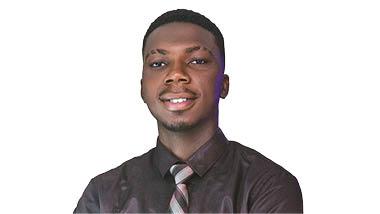In this interview, Agboola Israel Timilehin, a 400-level Environmental Management and Toxicology student at the University of Benin, discusses his election as President of the Student Union Government. He shares his journey and outlines his expectations for his new role with Olumide Olusegun.
Tell us briefly about yourself.
I grew up in Abeokuta, Ogun State, where I lived with my siblings and my parents. They had four of us: three girls and one boy, and I am the last born. I moved to Benin in early 2021, a few months before I gained admission.
What are some of the challenges that you faced since you joined school politics, and how did you handle them?
Yes, there have been challenges, but they stem from the context of clashing interests. Everybody has their own alliances with their department or class. There have been issues of conflicting interests, but somehow, we have always found a way to settle things. This has been true from my department to the faculty, and now at the school at large. So it is not a significant issue; these are normal occurrences.
What is the motivation that made you run for the position of vice president?
As an average student who has always been involved in parliament, we have typically worked behind the scenes, monitoring the executives, condemning, and criticizing. With what happened in the last administration, it became necessary for someone to step up and say it was time to rejuvenate this union. I took it upon myself, knowing it was the right time to take charge. The basis of my campaign was to rejuvenate the union and restore the faith of the students in it, because the union was essentially inactive at UniBEN. We are here to revitalize the union. How do we do that? By encouraging inclusivity and ensuring everyone is involved. This is a student union; there is no government here. Nobody is going to be left out; we are all going to do this together. They used to say big movements are meant for big people, but I don’t see myself as a big person. As I mentioned, I am an average university student. So it is normal for one of us to take charge.
Take us through how you prepared for the election.
When the electoral guidelines came out and it was stated that final-year students couldn’t contest, the school was trying to revert to the normal practice of conducting elections in the second semester. Since I am in 400 level, I have 500 level to go, so I met the first criterion. It was then announced that the election would be held online, which was happening for the first time in the history of the student union. This changed many things, including campaigning. The school imposed an embargo on any physical campaigning, noise-making, or mobilization of any sort. Everything was basically done online, and the preparation time was very short, about two weeks. We organized casual concerts, created groups, and engaged in online canvassing to promote our names. The real idea behind an online election is to ensure that your name and what you stand for resonate with people subconsciously, as they will be voting from the comfort of their homes. So you have to present yourself in a way that they will remember you. Everything was different from what we were used to; the usual jogging and queue systems and walking around the school shouting “Vote for me” were no longer possible. It was challenging, but we still had to campaign to encourage people to vote. We also placed more emphasis on the voting system since it was a first-time occurrence. We started teaching people how to vote with the new system. That was basically how we worked through it, and God granted me the victory.
Tell us about the challenges of studying as a Yoruba person in Benin. Did you experience discrimination when contesting for the position?
It has actually been quite easy being a Yoruba student in Benin. Most times, I don’t even remember that I am Yoruba. There is no tribal discrimination of any kind at UniBEN. Benin City does not encourage such things. In fact, it was after my election that I introduced myself to the Yoruba Students Association, so the issue of tribal identity was never part of my agenda. I have been gradually climbing the political ladder; I was elected as a representative of my department back in 2011, which had never happened before. Later, I became a faculty parliamentarian for two years until I decided to run for the position of president. By the grace of God, I won with over 7,000 votes. Right now, I am in office with the aim of rejuvenating the union.
What was the reaction of your parents when you told them you were contesting for the position?
You can imagine if your only son from Ekiti State tells you he is contesting for the position of SUG president in Benin City; certainly, you would be scared. There is no two ways about it. “Are you sure you want to do this? Are you really sure?” That is normal love and care from parents. But I explained to them the situation at the school and the fact that there is no discrimination and that there were no crises in the school. They supported me emotionally, financially, and spiritually. They were very involved in the process. In fact, my parents drove down from Abeokuta to Benin for my inauguration.
Aside from the support from your parents, how did you manage the funding for the campaign, as some believe you need a lot of money to campaign for SUG president?
Fortunately, it was an online election. All we were spending money on was data. It was not the usual rally with system addresses and sharing materials. It was just done via phones by sending messages and engaging in group chats.
There is a saying that you cannot be an SUG president without being a cultist. Are you a cult member in UniBEN?
No, I am not. That statement is false. Saying you can’t be a president without being a cult member is wrong; it is not the case at UniBEN because, before contesting, we went through three different screenings: the internal screening, a check by the school security where they reviewed our profiles and records, and even an evaluation by the state’s DSS (Department of State Security). If I had been a cult member before, there would have been no way they wouldn’t have found out and disqualified me.
You have won the election and are now the president. What should the students expect from your administration?
As I have been saying, my number one agenda is to rejuvenate the union and bring back the student union at the University of Benin. The last administration was suspended, and the union was proscribed, which caused students to lose faith in it. So, it is now my job to amplify their voices to the management and bring the management’s responses back to the students. When I say this is not a government but a student union, I mean it.
What is your advice to students seeking to become SUG president someday?
They should get involved early and build relationships now. But first of all, they should focus on service, not just the position.
 National Telescope national telescope newspaper
National Telescope national telescope newspaper



